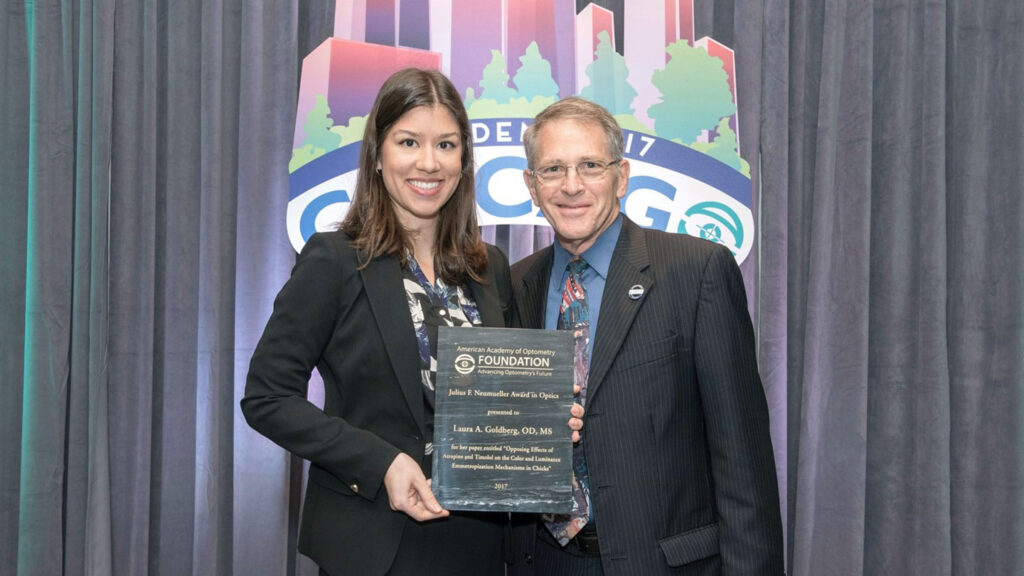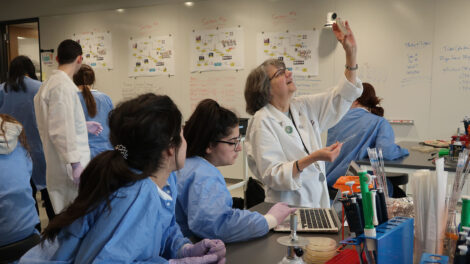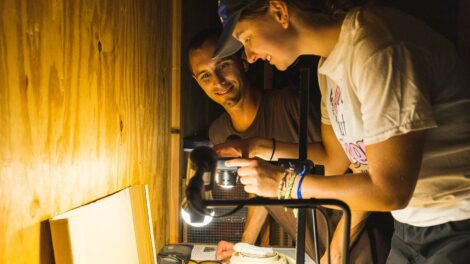Optometrist and Lafayette grad describes how her double major in biology and German opened her eyes to a career she loves
Laura Goldberg ’12 is an optometrist who practices at Woolf Eye Lab in Pasadena, Md. While her work mainly involves routine, emergency, and contact lens eye exams, she also has a concentration in fitting patients for specialty contact lenses. Goldberg has a passion for myopia control, which is a new innovative treatment that uses either eye drops or contact lenses to help slow nearsightedness in children. She earned a dual Doctor of Optometry degree and Master of Science in vision science from New England College of Optometry. She holds a Bachelor of Science in biology as well as a Bachelor of Arts in German from Lafayette College.

Laura Goldberg receiving the Julius F. Neumueller Award for her research in optometry school
What do you love about the work you do? How does it feel to be able to change the lives of your patients by helping them maintain their vision health?
I love being able to interact and work with people on a daily basis. It is a rewarding career because we can actually see the impact that we have on people’s lives every day.
I remember a male in his mid-20s who came into the office in desperation because he could no longer work his construction job due to poor vision that was not correctable with glasses. I decided to fit him with a special contact lens and was able to improve his vision enough where he could go back to work. He was so grateful and nearly burst into tears because he no longer had to worry about providing for his family. These are the patients that truly make this profession worth it.
The main thing I hope to accomplish each day is to provide the best eye care I can for each patient, and lend the right tools or devices to make their daily living as enjoyable as possible.
What sparked your interest in optometry? Was this something you always wanted to do?
I worked for an optometrist as a technician when I was in high school and college, and I realized that it is a great profession that combines my passion for science, research, and patient care. I knew I wanted to be in the science field coming into Lafayette; but when I got the opportunity to perform research with James Dearworth on identifying a gene responsible for visual responses in turtles, it solidified my passion for working in the vision field.
Can you tell us more about any particular professors, courses, or experiences that were especially influential to you during your time at Lafayette and that continue to impact your work today?
Dr. Dearworth was a huge part of my experience at Lafayette, starting from the Accepted Students’ Day where parents and new students were invited to sit in on presentations given by professors in various fields. When I listened to his lecture about his research in vision, I knew that I wanted to work with him and that he would be a large part of my Lafayette experience.
Starting in my freshman year, I became very involved in clinical research with Dr. Dearworth on identifying the eye gene melanopsin in turtles. Both my parents are research scientists, and I always found it exciting to be able to contribute my own small piece to advancing science. Dr. Dearworth proved to be not only an amazing and dedicated research mentor and teacher, but someone who truly cared about my future goals and helped me achieve them. I would not be where I am today without him.
Margarete Lamb-Faffelberger was another professor who greatly impacted my time at Lafayette. Although she was not in the biology department, she was head of the German department and played a vital role in helping me set up my study abroad program in Germany, where I was able to contribute to vision research on chlamydia eye disease, a disease that can result in blindness, especially in third-world countries. Not only was I able to work at one of the best research universities in the world, University of Würzburg, but I was able to find a way to combine my passion for German culture and language, vision, and research. This experience made me even more excited to pursue a career in optometry. Taking German motivated me to embrace and learn about new cultures whenever possible.
How did Lafayette help lay the foundation for your career?
Lafayette provides the opportunity for biology and pre-med students to take courses that will help better prepare them for their future careers, whether as clinical doctors or research scientists. The College offers one-on-one research with professors, teacher assistant positions that honed our mentoring expertise, and challenging yet rewarding classes that allowed us to improve our critical thinking skills. I especially enjoyed the higher-level biology seminars, where we learned to analyze and write scientific papers. These skills proved immensely beneficial when I was working on my master’s degree in optometry school. Furthermore, taking part in research made me appreciate the time and dedication scientists put into helping produce new drugs and devices that doctors use to improve their patients’ quality of life. It allowed me to experience science and medicine full circle.
I am able to sleep at night knowing that my mentors and education have provided me with the knowledge and skills to take care of patients, whether friends and neighbors, or families without health care in third-world countries.
What are your goals for the future?
My main passion right now is myopia control. This passion came from my master’s research, where I studied the effect of atropine (eye drops) in slowing myopia progression. With children spending more time than ever on computers and smart devices, especially during the pandemic, the rate of children with nearsightedness around the world is increasing at rapid rates every year. Not only can this lead to the need for stronger glasses, but being nearsighted can lead to detrimental ocular complications in the future, such as retinal detachments and glaucoma.
What kind of advice can you offer to current biology students about how to apply what they’re learning to their future careers?
My advice would be to take full advantage of any research opportunities, whether it is for a semester or for an honors thesis. It allows you to obtain a new perspective on science and medicine, even if you want to work more on the clinical side.
I cannot stress enough the impact the mentors at Lafayette have been on my life and success. One of the reasons I chose this school was the small student-to-teacher ratio and the ability to form strong relationships with professors and classmates.
Also, I think it is important to learn and take part in other subjects while at Lafayette. What is so great about Lafayette is that it is a liberal arts school, so you have the freedom to also take courses in foreign languages, art, or other fields that interest you. This provides you with a broader perspective on life in general and allows you to learn from other teachers with a non-science background.
If possible, take the opportunity to travel abroad, whether for leisure or a medical mission trip. It not only brings you new perspectives on science and medicine in other countries, but also opens your eyes to the impact and possibilities that your services can have on the world.
Push the boundaries, think outside the box, and broaden your perspective. Find a way to combine your passions and make an impact on the world. Most importantly, don’t be afraid to ask for help; everyone at Lafayette is here to support you and help you achieve your dreams.


